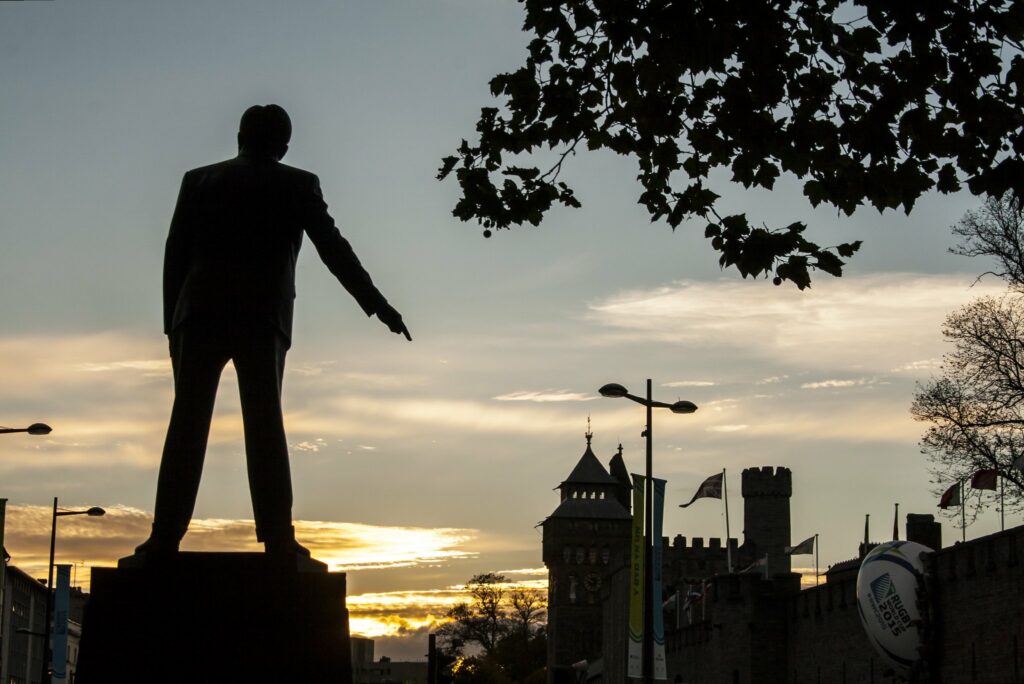Contemporary Wales is stalled by ‘cultural narcissism and the atrophy of intellect’, writes Dai Smith
Ahead of an IWA panel event at this year’s Hay Festival, where Dr Rowan Williams, Professor Laura McAllister and Miguela Gonzalez will talk to Auriol Miller about the work of the Independent Commission on the Constitutional Future of Wales, we asked leading Welsh writers for their answer to the question: What kind of Wales do you want to live in? In this piece, Dai Smith suggests a cultural shift must precede constitutional transformation.
We have gazed into this crystal ball before.
In 1907 Thomas Stephens gathered eighty Welsh sages in a thick volume entitled Wales: Today and Tomorrow to second guess by prophecy the glorious future surely ahead of us. The Editor himself concluded, with a sidelong glance at ‘social problems… attendant evils and difficulties’ (aka a disturbingly novel and alien working-class population) that ‘a new race is appearing in Wales – a middle class, wealthy, manufacturing folk, not Anglicised, not spoiled (sic)…which might serve Wales splendidly.’ Oops. That’s just widespread industrial conflict, two world wars, global economic depression, grinding poverty and de-industrialisation to come, then, to ruin the Big Picture. Oh, and the concomitant rise of Social Democracy, root and branch, to counter the smug hubris of that past century’s dawning, and indeed that of this one.
We have to find the will within this Wales, here and now, to ditch the politics of Influence in favour, once more, of the influence of Politics
Drawing up a blueprint for a future Wales, whether in 1907 or 2023, is akin to moving the deckchairs on the Titanic before she sailed. The Governance of Things on a directionless Ship of Fools. Effective constitutional change always comes after the revolution in attitudes which it facilitates and never as a bells and whistles vehicle without wheels only fit for a society in stasis.
We are currently stalled by a contemporary cultural narcissism and the atrophy of intellect which values description more than analysis. In this a-historical perpetual present to which we have consigned ourselves we are all too ready to forget that our near past was lived out in a Wales that was neither a Brand nor a Team nor a Logo nor a Bucket Hat or any kind of name-changing Cymru.
Our overwhelming need for a meaningful connection between an actual past and a definable future will not be found in any mooning after a cosmetically emotive unity but rather in a mature acceptance of who we have been, in all our diverse complexity, within the borderlines of a geographical expression which we should be variously seeking, again, to fill with social purpose and communal vigour.
Robust debate and agenda-setting research.
Support Wales’ leading independent think tank.
Not policies, therefore, to be administered and formalities to be managed for us – but the politics of vision and of social transformation which we once manifestly created and possessed for ourselves. Our greatest rooted visionary, Aneurin Bevan, thought that informed public life required an educated citizenry for whom there would be ‘no conflict between a wide cosmopolitanism and a rich local life. The one gives meaning and particularity to the other’. He wrote that just before 1945 when the notion of constitutional tinkering came a long way down the list of his priorities for principled equality in all things, from health to education from welfare to aspiration, and all powered by the accessibility made potent and possible by a social democratic polity.
The latter is necessarily universal in reach and secular in stance. It is pluralistic in both intent and its outcomes. It should not be undermined, however understandable the reasons, by the fissiparous tendencies of all manner of identity politicisation which remains secondary to the common good.
Its endeavours were collective and must be so anew as we move on into an undoubtedly murky future of uncertainty and fear. We have been there before, as Raymond Williams told us in 1983 when, looking towards 2000, he recalled how communities of self-worth and intense loyalty, the one to the other, had been made from virtually nothing in the former mining valleys, and could be fashioned, but differently so, again: ‘I believe in the practical formation of social identity and how that has to be lived… It is by working and living together, with some real place and common interest to identify with, and as free as possible from extreme ideological definitions that real social identities are formed.’
As to whether they will flourish through struggle within a unified or federated UK state or via an independent Wales circumstances will dictate in due course, but first, we have to find the will within this Wales, here and now, to ditch the politics of Influence in favour, once more, of the influence of Politics. Remember there will always be icebergs ahead and to see them clearly we will need to be more Wide Awake than Woke.
Dai Smith’s Off The Track: Traces of Memory is now out from Parthian Books.
To join the IWA at the event on Wales’ constitutional future, buy tickets here.
All articles published on the welsh agenda are subject to IWA’s disclaimer. If you want to support our work tackling Wales’ key challenges, consider becoming a member.





